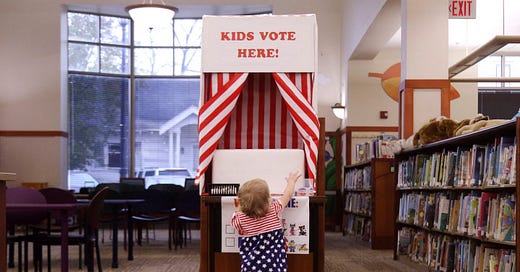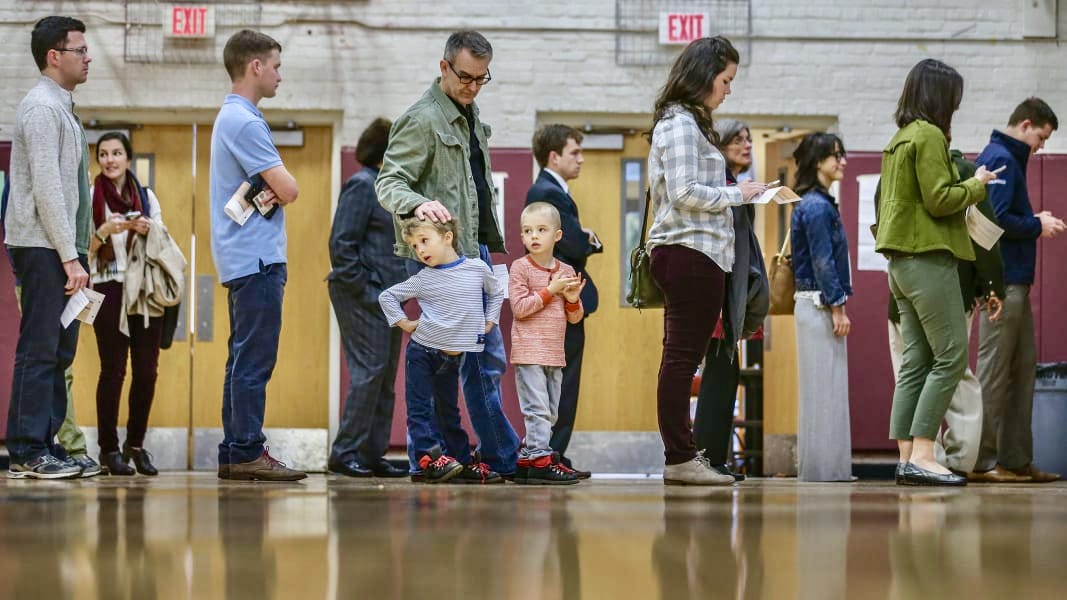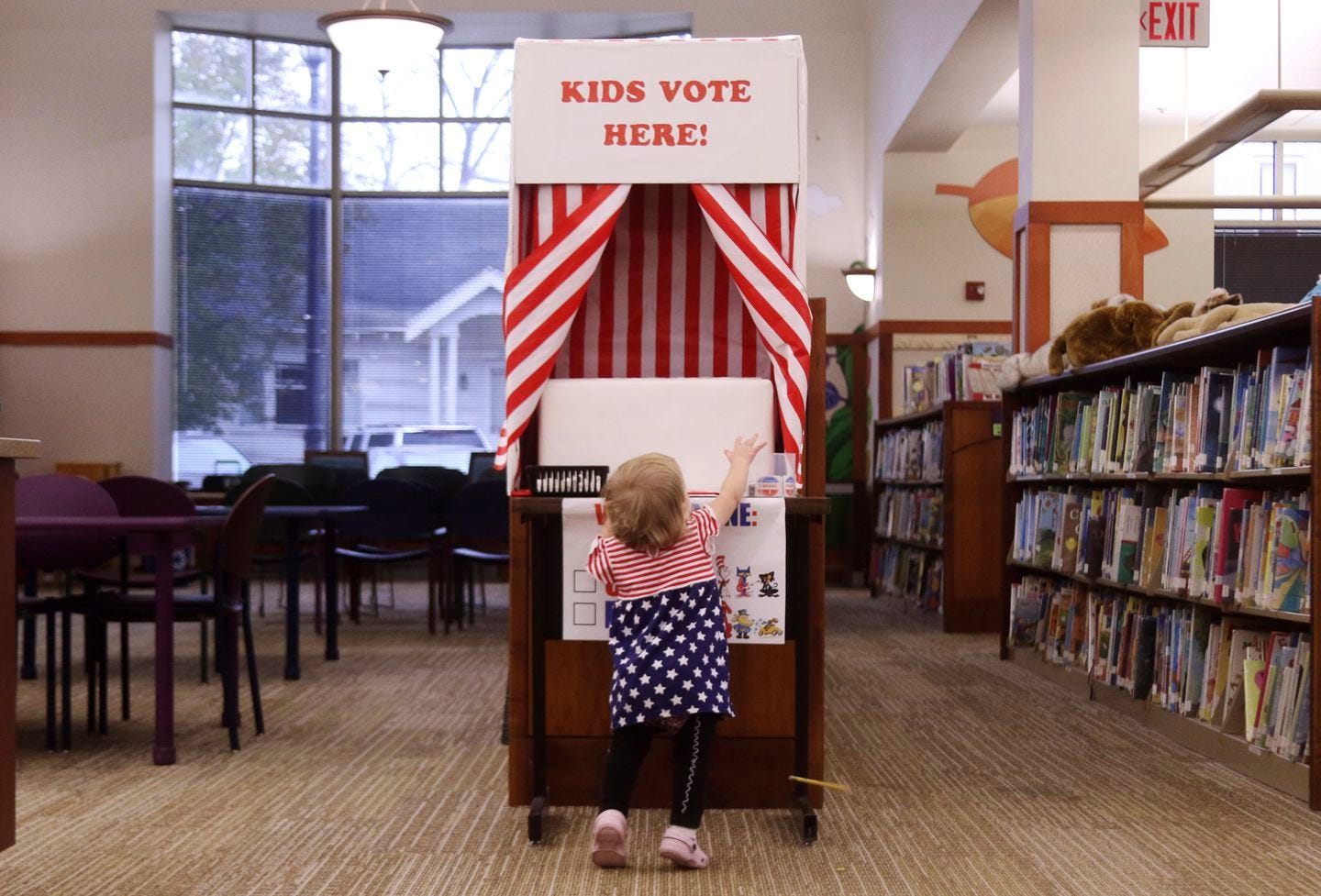Should kids get the vote?
Extending universal suffrage to children is starting to be embraced by both the left and the right. Perhaps it can help us see more clearly how self-governance should really work.
In the fall of 2021, two of the largest newspapers in the English-speaking world — the New York Times and the Guardian — both published articles arguing that we should give children the right to vote. The Guardian’s version went as far as 6 year olds (“if you can go to school, you can put a cross against a box”) whereas the Times article advocated knocking down all barriers and starting the franchise at birth (“the minimum voting age should be zero, with parents and guardians casting the vote for their small children”).
It’s notable that both articles were written as part of a series of cutting-edge, thought-leader essays. The New York Times called their series “Snap Out of It, America!” and heralded it as an exploration of “bold ideas to revitalize and renew the American experiment,” while the Guardian called their series “Reconstruction after Covid,” referencing a similar series they published after World War I — “Reconstruction in Europe.” That series, which was curated by the celebrated economist John Maynard Keynes, had a significant impact for its time. It consisted of 12 monthly supplements to the paper that were read widely, not only in England but throughout Europe, each issue being translated into 5 different languages.
It’s unclear whether these new efforts will have the same kind of impact, or really any impact at all. For all their attempted boldness, these essays can seem more like bluster, like big ideas that might be big… or might not. This is interesting in itself as it begs the question, Have we run out of ideas? Has the well run dry?
The main argument both articles make for why we should extend the vote to children could be described as, “Well, why not?” Who, after all, would want to argue against universal suffrage? Who would want to say “The vote should extend to all people… but not those people”? Who would want to put an asterisk after “one person, one vote,” and say “Well, it isn’t literally ‘one person, one vote’”? And if you’re feeling the itch to argue that 6 year olds aren’t competent when it comes to understanding politics, do you really want to start applying competency tests to voters? Are you aware of the literacy tests that were used in the American South to suppress black voters with less access to education? And would you be willing to disenfranchise other groups that might be incompetent in some way, like the elderly, physically impaired, or neurodiverse?
These are the strongest arguments for giving children the vote, but they still don’t actually address why we should do it. They don’t address how it would actually benefit anyone — the children themselves, or society at large.
For all his enthusiasm for the idea, the author of the Guardian article, David Runciman, doesn’t himself seem fully convinced. He ends the article on a high note, quoting the political theorist John Wall:
“(Giving children the vote) is vital to making contemporary societies more democratic… It is not the answer to everything. But it must be part of the solution. Things need realigning and this is arguably our best hope for doing so. No politics is ever perfect. But if societies want to be truly democratic, they need to overcome their engrained biases and embrace the whole human community.”
This is some pretty lofty and soaring prose. Wall admits that it’s “not the answer to everything” (no?), but he still thinks it’s “our best hope.” In comparison, Runciman himself barely achieves lift-off when it comes to his own critique:
“Giving children the vote would not, contrary to many people’s expectations, be transformative. Mass enfranchisements rarely are. The same kinds of people still end up getting elected, because the incentives for becoming a politician do not change. As the old saying goes, if voting really changed anything, they would abolish it… But it could invigorate our democracy, improve it, vary it, leave it a little less ossified, a little less predictable, a little less stale.”
This does not inspire enthusiasm — in fact, it seems a little bit like a nothing burger. Hey, I’ve got an idea: Let’s radically alter our voting system so that it’s “a little less predictable, a little less stale”?
But the New York Times article is no better. The author of that piece claims that it might somehow encourage more child-bearing in a time when America has its lowest ever birth rate, and that it would give kids some serious responsibilities so that they’d grow up to not just be a bunch of whiny narcissists.
Though it might sound a bit cynical, it’s hard not to ask, What might be the motivations, the political calculus, behind such advocacy? Neither article seems born of some particular love for children, or by some horror at their current political condition. So the question naturally arises, Who stands to gain?
Interestingly, both the left and the right could gain voters from the enfranchisement of children, depending on how it was done. If the vote was only given to somewhat older kids (as the Guardian article proposes) then one could well imagine the majority of them leaning left on such issues as climate change or ending gun violence.
But the author of the New York Times piece, Lyman Stone, is a conservative who works with both the American Enterprise Institute and the Institute for Family Studies. This makes sense of why he might favor extending the franchise to the just-born. In that scenario, parents would vote on their children’s behalf until they can vote for themselves, in which case the political calculus might tilt in favor of conservatives (who generally promote family life, and large families at that). It also helps make sense of the fact that, at the very end of the article, Stone seems to be defending himself against the accusation that he’s just trying to give more political power to parents (“Giving children the vote wouldn’t make a direct transfer of any kind to parents…”), even though such an accusation is by no means obvious from reading the article, so there’s no need to defend himself.
Though the arguments for extending suffrage to children might seem absurd to many people, it’s possible we’d still stumble down this road incrementally because, Hey, why not? — Does anyone have a better idea? Presidential candidate Andrew Yang, when running for mayor of New York City, already proposed lowering the voting age to 16. It’s not hard to imagine such measures passing over time, and the age criterion being slowly chipped away at — first to 16, then to 14, then to 12.
And, Why not? What’s wrong with lowering the age limit for voting? There are two main reasons why we shouldn’t give children the vote: one is for the sake of children, for their own healthy development; the other is for the sake of democracy. Let’s start with the kids themselves.
By just about every measure, we’re already forcing kids to grow up far too quickly. Parents often aggressively try to get their kids into the right preschools, schools, and after-school programs, in order to then get them into the right colleges and jobs, and onto the path of success. This means pushing kids hard, which ultimately just hurts them. Add to that the fact that they’re constantly on screens navigating a strange, disjointed maze of shows, advertisements, and social media interactions (according to one measure, the average 8-12 year old spends 4-6 hours a day online, and the average teen up to 9 hours), and the picture isn’t pretty. How many times have you heard an adult say to a child “When I was your age, I used to run around outside all day and didn’t have a care in the world.” What happened to play? To make-believe? To just being a kid?
We should be protecting childhood, not contaminating it further. Though many people seem to think the world will end any day now, so kids might as well grow up and face the facts, they’re wrong. Forcing children to skip childhood won’t help anyone. We’re just raising new generations that will be uptight and fearful — unable to breath — and not creative, confident, and imaginative of new possibilities.
Partisan politics is already tearing the US, and much of the rest of the world, apart — does anyone really want to bring that into schools? Does anyone really want to invite slick politicians into kindergartens to woo their new rosy-faced constituents? It just sounds terrible, like adults are abdicating their responsibility: “Well, we couldn’t figure out how to make it work, so maybe you can. Good luck!”
And this is the real problem — we can’t figure out how to make democracy work. It’s broken, but we don’t know how to fix it, and the idea of giving children the vote just illustrates that fact. It makes clear that we think voting for representatives is the central act of democracy, that it’s the shining crown in our experiment in self-governance. In which case, let’s just do more of that. Let’s have more people vote. Let’s “get out the vote” because “every vote counts!”
But really, voting for a representative is just one tool in the democratic toolbox, and a dull one at that. Because of course, being a representative is another basic way of engaging in democracy. (Should we let children run for office as well?) And democracy isn’t even essentially about representatives and constituents — we’re already defining it too narrowly. It’s about people actually participating in self-governance. It’s about people meeting together and making decisions as a community of equals.
Obviously, we don’t currently do much of that sort of thing, and this is a big part of the problem. We don’t practice democracy, we leave it to others to practice for us. But there are a number of ways we could practice it that would actually “revitalize and renew” our striving for self-governance. (I’ve written another article on some of the basic ideas of direct democracy and open democracy, such as instituting the basic responsibility — much like jury duty — for people to participate in randomly selected groups of citizens that would review prospective and existing laws, and perhaps even write new ones).
But to do any of this — to engage with the democratic process on a deeper level — we have to actually be equals in some fundamental way, otherwise it’s untrue. And though every human being is equal in a spiritual sense, we’re not equal in an earthly sense. The ground of our equality in outer life, in society, is the fact that we’ve all reached a certain basic level of maturity.
The growth that takes place in our infancy and childhood is absolutely profound. It’s a kind of natural growth, it happens to us — our physical body and with it, our inner life, simply evolve during those years (though of course family, education, and culture all play a huge role in forming our inner life). Such growth slows down significantly once we’ve reached adulthood. At that point we’ve all reached a relatively similar stage in life, so it’s in adulthood that we can truly meet as equals and make decisions concerning how we should shape our shared social life.
The author of the Guardian article recognizes this when he says,
“In some ways, children do inhabit a different planet from the rest of us… The lives of six-year-olds are deeply mysterious to most adults. That is a large part of why democratic politics should at least be open to their perspective.”
But this is to misunderstand the nature of that difference and how we should be working with it. The answer is not to treat children like adults — we don’t need to survey 6 year olds in order to grasp the mystery of what they’re experiencing. They can’t express it through polls, nor should we ask them to. Instead, we should let them simply experience the world, and ideally the healthiest world possible. We have to build that world for them, so that they can grow up and build it anew for the next generation.
Giving kids the vote is a terrible idea — in reality, it will only further rob them of their childhood. And it certainly won’t fix democracy. To do that, we have to get past the idea that checking a box every few years is the same as self-governance, and instead create the forms whereby we can actually deepen democracy. This is the only way to make its promise of equality a lived experience. We need to learn to wear that mantle, as uncomfortable as it is, and not try to pass it off to others. We need to take responsibility for our own mess. It’s time to start acting like adults.
(If you want to read more articles on this topic, take a look at this one on taking money out of politics, as well as this one on “experiential democracy.”)







